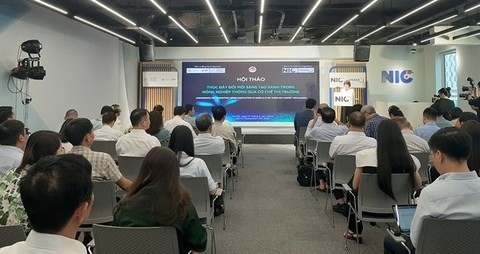Flexible market mechanisms will promote green innovation in agriculture
Flexible market mechanisms will promote green innovation in agriculture
To promote green innovation in agriculture, Việt Nam needs to build a flexible market mechanism to encourage and support the development of environmental agricultural products.

A conference on promoting green innovation in agriculture through market mechanism was held in Hà Nội on September 17 by the National Innovation Centre (NIC) and the Vietnamese Australian Scholars and Experts Association (VASEA). — Photo courtesy of NIC |
This was the recommendation of Deputy Minister of Planning and Investment, Nguyễn Thị Bích Ngọc, at a conference on promoting green innovation in agriculture in Hà Nội on September 17.
Agriculture now accounts for about 12 per cent of Việt Nam's GDP and about 30 per cent of the workforce, according to Ngọc.
However, this sector faces major challenges including climate change. For instance, the Mekong Delta - the country's largest rice producer - is forecast to lose from 500,000ha to one million ha of agricultural land by 2050 due to rising sea levels, causing annual losses of up to three per cent of GDP.
The challenges are forcing agricultural production towards a more sustainable development and lower emissions.
Green innovation is a core factor that helps agriculture respond to those challenges. At present, many Vietnamese enterprises have applied green technologies in agriculture, from drip irrigation systems to smart greenhouse technology and the use of renewable energy in production, according to the Ministry of Planning and Investment.
These models have helped them reduce carbon emissions, save water by up to 50 per cent and increase crop yields by 20-30 per cent.
Việt Nam also aims to reduce greenhouse gas emissions by nine per cent by 2030 and commits to achieving net zero emissions by 2050. To achieve those goals, green innovation in the agricultural sector plays a key role.
However, it also faces many challenges. One of them is human resources, especially high-quality human resources, which are still limited with Việt Nam lacking experts in agriculture and trained rural workers.
Farmers need to be trained in advanced farming methods, sustainable land management and efficient use of resources. In addition, they need access to green technologies, new crop varieties and green credit sources.
Green agriculture start-ups also face difficulties in connecting with experts, accessing markets and expanding production scale. Lack of infrastructure and resources is also a major barrier that needs to be addressed to promote the development of these enterprises.
Discussions were taking place at the event held at the National Innovation Centre (NIC) hosted by the Ministry of Planning and Investment in coordination with the Vietnamese Australian Scholars and Experts Association (VASEA).
The market mechanism played an essential role in implementing green innovation in agriculture, said Todd Sanderson, Social Systems Research Programme Manager of the Australian Centre for International Agricultural Research (ACIAR). This mechanism would help this sector increase productivity and reduce emissions and if it is not applied, it would affect the interests of small enterprises and farmers.
At the conference, participants gave suggestions on financial incentives for farmers to carry out green production in the rice sector and details of the costs and benefits of farmers when applying low-emission farming techniques.
There were also details on carbon credit certification and guidance for farmers and businesses on the process of converting from applying low-emission farming techniques into tradable credits.
Dr Nguyễn Thị Hải from the Australian National University said that the carbon credit market would open up new opportunities for farmers. The application of advanced farming techniques would not only bring high-quality rice products, but also bring a significant amount of carbon credits and the world's demand for this type of credit was increasing.
Meanwhile, Associate Professor Chu Hoàng Long from the Australian National University said that technical solutions, supportive policies and also economic and social factors would have a great impact on green production. Rice producers needed to be economically incentivised to apply low-emission techniques.
Overall rice producers would incur costs to reduce greenhouse gas (GHG) emissions.
So, producers should be compensated for reducing GHG emissions and market mechanisms were generally considered an efficient way to compensate, i.e., the reduction in emissions to be compensated via trading carbon credits.
However, the market mechanisms would require a certification process and should be designed in line with national goals, Long said.



























